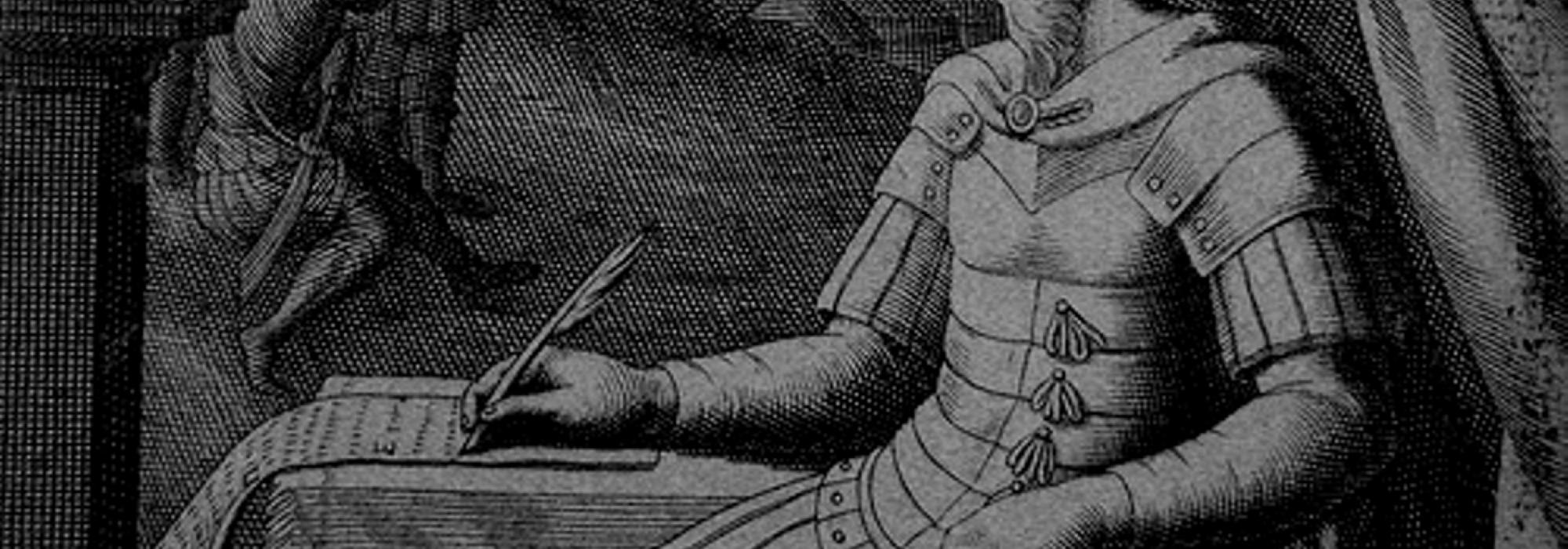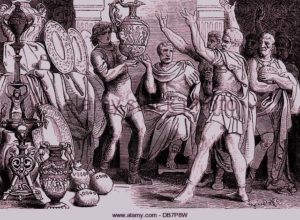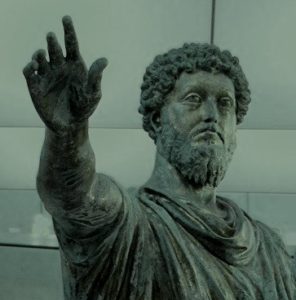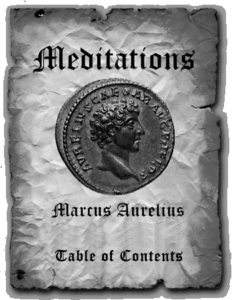"Meditations of Marcus Aurelius" by the ancient Roman Emperor Marcus Aurelius is one of the great books, which has an all-time relevance because of the practical knowledge, philosophical maxims and psychological insights that are expounded there. The worth of these observations will be more enhanced as Marcus Aurelius as an emperor had to face the problems of his government, had to lead his soldiers against outlandish tribes, and had to participate in the wars also. As such these meditations are not mere broodings of a man in an ivory tower but of a man of actions with a wide experience in all fields of life.
Marcus Aurelius, born in 121 CE, was adopted by his uncle, the emperor Antonius Pius and was succeeded to the throne in 161 CE. There are ample examples in the 'Meditations' of an extremely careful, intricate and a high quality education that the emperor was subjected to. As an emperor and as an individual, Marcus had to confront with various problems in his palace (family) and in his office. When he came to the throne, Christianity was not much popular, powerful and widespread. Besides, during that period Rome was rocked by national misfortunes (calamities) like floods, famines, fires, earthquakes, and epidemics. A large part of Rome was inundated by the floods in the river Tiber. To crown these calamities there was an uprising by the unruly warlike Parthians.
Verus, another adopted son of Antonius was sent to subdue the rebels. But his sensual indulgences ruined the purpose of war. By the help of the brave generals and Marcus Aurelius's fortitude, Parthenians were completely subdued. But a pestilence broke out and Germanic tribes and the distant Briton thundered a revolt. Italy was reeling under the shadow of the fear of war. At the time like this, Marcus Aurelius went into the camps. With the death of his brother Marcus became the sole, undisputed master of the Roman Empire. It is interesting to note that most parts of the "Meditations" were written during the course and various campaigns of the emperor. This fact gives a poignancy to the maxims advocated here, as they are written by a man who encouraged his soldiers in the war, who encountered the wavering fortunes of war with a brave and balanced mind.
He was very fortunate in having the great company of the persons like his father, grandfather, and his mentor. But he was not happy, it seems, in his marriage and family life. His wife Faustina, it is said, was of a dubitable character and his son Commodos was a brutal ruffian who did not have any traces of the virtues of his gentle, philosopher father.
The keynote of the 'Meditation' is this:
This evinces the emperor's rational, philosophic outlook and an awareness that man cannot be segregated from the society in which he lives. Yet it is pointed out that this generous, rational, liberal-thinking emperor consented to the prosecutions of the Christians. Two persecutions took place in the reign of Marcus Aurelius (it is pointed out). A certain Polycarp suffered in Smyrna (perhaps 167 CE) and the other was the notorious trial at Lyons (177 CE). It is hard to swallow that such a humane, gentle and generous Emperor could sanction the torturous executions or persecutions of the Christians. With Nero, this attitude can be digested, but with Marcus Aurelius?
By shifting ourselves to the second century Rome, I think, we may understand these things better. At that time in Rome, Christianity was regarded as "pernicious and detestable superstition." The one thing that might have outraged the public against the Christian communities or the missionaries, was, their obstinacy. Men like Marcus Aurelius had accepted the established paganism (of Rome). But they had given liberty to other faiths also, as long as they did not attack the "recognized orthodoxy of Rome." It was beyond the grasp of the Romans to understand why these Christians so strenuously and persistently put forward their own faith and wanted to conquer paganism and prove the Roman deities as devils or as nothing.
From the Roman point of view, these Christians were a sort of "religious anarchists." They were "militant and polemical." They wanted to destroy the established creed. Besides, there was a large amount of ignorance regarding the tenets of Christianity. Sometimes common people with a violent hatred forced the officials to penalize the Christians. In turn, the governors and the officials appealed to the emperor to sanction legislative acts against the Christians, chiefly perhaps, to maintain peace, stability, and discipline. The emperor had to consent -- for the survival of the empire. It does not seem to be the outcome of fanaticism or hatred of other religions. These persecutions of the Christians in Roman society of the second century throws light on such incidents in our contemporary world.
But the great paradox, that the tenets of Christianity and the maxims of Marcus Aurelius are so similar, really astonish. Just look at this famous maxim of the Emperor, "The pride which is proud of its want of pride is the most intolerable of all." One may be easily misled that it is from the Bible or from Hindu scriptures.
"Meditations," the occasional and discursive remarks of Marcus Aurelius are distributed into twelve books. The form of these, written when the emperor had engaged himself in campaigns and warfares, is that of a private diary. The main theme (motif) of these notes is the discussion, contemplation, and comprehension of the triangular relationships of Man, God, and World; God, Man, and Society; Man, Man's Social Conduct, and his interaction; life-death, fear of death, and method of overcoming the fear of death. Although it is observed that there is nothing systematic in the reflections of the emperor the 'Meditations' sometimes fit into the general framework of thought, provided by Stoic philosophy. It adheres to the main stoic tenet that "Man ought to live conformably to nature." Further, "Man should so guide his life that he, a part of the universe, should move in harmony with the totality of the things."
The stoics believed that man and the cosmos were composed of two parts: spiritual and material (matter, intelligence, reason). The reason should guide and physical properties of the human beings should obey. Marcus Aurelius does not simply stop merely at exploring these principles, but practices these in his own life, stressing that "life is not theory but action; and it is of course action, experience, the daily conduct, which are of the greatest importance." Marcus Aurelius observes that one many act noble in some great occasion but to be noble, to be good in small things of life needs patience, tolerance, and acute ethical sense, an ever-awakening moral awareness. This evinces the emperor's social awareness, psychological insight, and human concern. (That too, at the distance of time when sociology and psychology were not taught systematically).
According to this emperor, "Man is intended to be social; he is one unit in a society bigger than himself and he must learn the lessons of unselfishness. He cannot pursue his own good to the exclusion of that of his neighbours. He has hardly any individual rights apart from those which spring from the social constitution to which he belongs. He must not attempt to divorce himself, by a life of seclusion from the life of the community at large." Although it seems there is a curb on the rights of an individual, perhaps it is needed to prevent chaos in a society. The whole gist of the emperor's reflection is mirrored in this maxim, "We must bear one another's burdens." This is the solution he suggests to the problem of tensions, interactions between society and individuals. A sort of ethical socialism advocated by the twentieth century Russian Nobel Laureate Alexander Solzhenitsyn is stressed by the emperor also.
The importance of reason in human life is much stressed by the emperor. He writes, "As human beings we must be guided by reason and not persuaded by the passions of the body. We must be swayed by the spiritual and intellectual elements within us and thus acknowledge and establish the supremacy of intellect and reason." (It is completely contrary to Lawrence's concept of the supremacy of the instinct.)
With his profound knowledge Marcus was very humble. He writes, "Everywhere our knowledge is limited by our ignorance. We do not know very much about the ultimate constitution of things. It is enough for us to realize that we are in the midst of a world which is not accidental or haphazard, but which evolves according to a settled plan, and we are in the hands of reason of a providence which is intelligent and if we train ourselves properly we shall be masters of our own souls."
"Did God create this universe at a given moment? or has this universe existed from all eternity?" Questions like these are mere unprofitable questions according to Marcus Aurelius. "How do we know there are Gods when we do not see them?" This question is answered by him: "The universe at large shows us in the laws of nature, the existence of divine foresight, we do not see our own souls, yet every rational being believes that he has within him an individuality, an inner spirit, which can guide his affairs with discretion. We do not see this inside thing, yet we believe in the existence of this inside thing. Everywhere there are Gods. If we live, we are surrounded by them whenever we go, when we die, there too will be Gods."
And what is this death? The emperor's reflections on death present the essence of all philosophies. "Death," he says, "is more formidable than birth." He describes the cycle of birth-life-death (stages of this cycle) like this: "We are nothing, we become something, we cease to be something, and we become nothing." How simple! Everywhere, throughout the universe there are changes, dispersion of elements and fresh aggregation of elements. Things fade, die, and revive.
As an emperor, Marcus Aurelius had internal as well as external enemies. Moreover, as a man of action, he had to participate in many wars. Thus, death was to him a Damocles' Sword. Naturally, the theme of death, fear of death, overcoming the fear of death occupies greater part of "Meditations." By familiarizing or romanticizing or through stoic acceptance, men try to overcome the fear of death. Sometimes death is considered a middleman who takes man towards immortality. Along with stoic acceptance the emperor fuses intelligence, practical knowledge, philosophy, logic, and scientific outlook, in his views regarding death. He says, "death is an operation of nature" and "if any one is afraid of nature, he is a child," "death is also a thing which conduces to the purpose of nature." He states that the awareness of immanent death should stimulate men to regulate their thought and action. The emperor argues, "But to go away from men, if there are Gods (there), is not a thing to be afraid; for the Gods will not involve thee in evil; but if indeed they do not exist, or if they have no concern about human affairs, which is it to me to live in a universe devoid of Gods or devoid of Providence." But the emperor, in truth, feels "they (Gods) do exist, and they do care for human things and they have put all the means in man's power to enable him not to fall into real evils.
The important code of conduct stressed by the emperor is "not to pry into the minds of our neighbours. It is sufficient to attend to the daemon within him and to reverence it sincerely. And the reverence of the daemon consists in keeping it pure from passion and thoughtlessness and dissatisfaction, from what comes from Gods and men. For, the things from Gods merit veneration for their excellence; and the things from men should be dear to us by reason of kinship; and sometimes even in a manner they move our pity by reason of man's ignorance of good and bad."
These maxims of the emperor in a nutshell involve the essence of Hindu philosophy, Christian doctrines and some of the transcendental elements of Emerson and others. More than that, the insistence on acceptance of life and the equal importance given to this physical, material world of men and the spiritual, metaphysical worlds of Gods endears this ancient emperor to the modern minds.
Marcus Aurelius's reflections on offenses evince his deep psychological insight and humane attitude. Besides, they surprise us with the most modern elements with a minute analysis of intentional offenses and unintentional offenses. Quoting Theophrastus, the emperor writes, "The offenses which are committed through desire are more blamable than those which are committed through anger. For, he who is excited by anger seems to turn away from reason with a certain pain and unconscious contraction but he who offends through desire, being overpowered by pleasure, seems to be in a manner, more intemperate and more womanish in his offenses. The offense which is committed with pleasure is more than which is committed with pain..." These observations are not surely of the modern criminologists, psychologists or advocates of reformative theories but of the emperor of Rome in the second century, where revenge, retribution, punishment, and persecution were the very norms of society.
The other element that astonishes the mind in the "Meditations" is the proper understanding of the importance of poignancy of the present and flux of time. Some of the ideas of the emperor of the second century correspond with the ideas of the poets and philosophers of 19th and 20th centuries. "Time past and time future / What might have been and what has been / Point to one end which is always present" (Eliot in Burni Norton).
Let us see what the emperor says about the concept of time. "Though thou shouldst be going to live three thousand years and as many times ten thousand years still remember that no man loses any other life than this which he now lives. The longest and the shortest are thus brought to the same. For, the present is the same to all, though that which perishes is not the same; and so that which is lost appears to be a mere moment," "For a man cannot lose either the past or the future; for, what a man has not, how can anyone take this from him? These two things, then thou must bear in mind; the one, that all things from eternity are like forms and come round in a circle and that it makes no difference whether a man shall see the same things during a hundred years or two hundred or an infinite time; and the second, that the longest liver and he who will die soonest lose just the same. For the present is the only thing of which a man can be deprived, if it is true that this is the only thing which he has..."
According to the emperor, "...the time is a point, the substance is in flux, and the perception dull and the composition of the whole body subject to putrefaction, the soul a whirl, and fortune hard to divine, fame a thing devoid of judgment... Everything that belongs to the body is a stream and what belongs to soul is a dream and vapour, and life is a warfare and a strangers sojourn, and after fame is oblivion." Doesn't this picture perfectly fit into the frame of absurd philosophy? What can guide a man in this absurd situation?
According to Marcus Aurelius, only one philosophy can save man, that is to keep the daemon within a man free from violence and keep it superior to pain and pleasure, to do nothing without a purpose nor yet falsely or with hypocrisy... to accept all that happens and that is allotted as coming from thence, wherever it is from whence he himself came...
Tolerance and patience which are needed more than ever at present are advocated by the emperor like this: "Art thou angry with him whose armpits stink? Are thou angry with him whose mouth smell foul? What good will this anger do to thee? He has such a mouth, such armpits; it is necessary that such emanations must come from such things." As such Marcus Aurelius advises us to stir up such person's rational faculty with our rational faculty and show him his error and compel him to listen to so that he will be cured and there is no need of anger. It is just like present day counseling and consultations with the psychoanalysts or a discourse with saints.
The first book of "Meditation" is a salutation and an acknowledgment of debts by the emperor to various persons -- relatives and others -- who had influenced and helped him in the formation of such a strong, brave, yet humane character. He first remembers his grandfather who had adopted him and from whom he had learnt good morals and governing of his temper. Marcus Aurelius writes that his mother's influence was very great on the formation of his character, for, he says he learnt pity, beneficence, abstinence not only from evil deeds but even from evil thoughts, from his mother. He learnt from her simplicity in living. He was taught be his governors that to be an emperor, endurance of labour was essential.
Besides these, to want little, to work with his own hands, not to meddle with other people's affairs, not to be enthusiastic to listen to slander, were also stressed in his training. Aurelius remembers many great men like Diogenes, Rusticus, Appolonius, Maximus and others who moulded his character. Marcus's writings reveal that he was very much influenced by his father. Rather a long passage is reserved to the memory of his father. He offers a fine tribute to his father in these words: "and that might be applied to him which is recorded of Socrates, that he was able to both abstain from and to enjoy those things which many are too weak to abstain from and cannot enjoy without excess." It was his father who took away all pride from his son and made him to realize, that it was possible for a man to live in a palace without wanting either guards or embroidered dresses or torches, statues and other pompous shows.
Lastly he offers salutations to the Gods for providing him good kith and kin, friends -- everything good. These formative influences have given the emperor such a sweetness of temper and moulded him into a fine combination of statesman, warrior, philosopher, and a human being with an ever-throbbing heart for the pains of others and an acute sense of right and wrong.
In the second book, Marcus Aurelius defines the modes of code of conduct and daily confrontation with the people in this world. He says, it is not by blaming the world and the people in it, but by strengthening ourselves and being confident of our reasoning and our capability of judging between right and wrong, we can confront the world in a proper manner. We cannot expect the world to love us, to respect us. Neither can we expect the people to be sane and good. So the emperor advises,
"Begin your morning by saying to thyself, I shall meet with the busybody, the ungrateful, arrogant, deceitful, envious and unsocial person. All these things happen to them be reason of their ignorance of what is good and evil. But I who have seen the nature of good, that is beautiful, and of the bad that is ugly, and the nature of him who does wrong, that is it akin to me, not (only) of the same blood or seed, but that it participates in the same intelligence and the same portion of the divinity. I can neither be injured by any of them, for, no one can fix on me what is ugly nor can I be angry with any kinsman, nor hate him. For, we are made for cooperation like feet, like hands, like eyelids, like the rows of the upper-lower teeth. To act against one another, then, is contrary to nature; and it is acting against one another, to be vexed and to turn away."
The first paragraph of the second book is complete quoted here and it reveals the emperor's profound knowledge of the world in general and the difference between wise and the rest of the world. Besides, the emperor's views stress the need of cooperation and an understanding of human nature which help the smooth and harmonious functioning of human relationships. But it is a seer's approach that is advocated here and that may be really difficult to achieve. As a man of action, Marcus Aurelius prefers not to postpone our actions. He advises "to act" as though we are leaving this world "now," "at this very moment." This, he says, gives a 'spur' to our actions. He warns not to be distracted by the books and not to be pulled like puppets to any unsocial movements. Again he writes, "no longer either be dissatisfied with thy present lot of shrink from the future." He stresses upon the proper understanding of the relation between the whole -- the universe -- and the part -- the man, and this actually eases the tension.
Some of the maxims of the emperor will never lost their relevance, may be quoted:
"Look within. Let neither the peculiar quality of anything nor its value escape thee."
"Take care that thou are not made into a Caesar."
"Repentance is a kind of self-reproach for having neglected something useful."
"The art of life is more like the wrestler's art than the dancer's...in respect to this, that it should stand ready and firm to meet the onsets which are sudden and unexpected."
In another passage he writes, "The whole universe is a flowing stream, some things hurry into it and some other hurry out of it. Motions and changes are continuously renewing the world; just as the uninterrupted course of time is always renewing the infinite duration of ages. In this flowing stream in which there is no abiding what is there... on which a man would set a huge price? It is just like falling in love with sparrows which fly by, but it has already passed out of sight." Through many examples like these, the emperor drives home the concepts of eternally renewing (yet eternal, changeless seeming) time and the fascinating, enchanting but ephemeral objects and pleasure of life. He makes us realise finiteness of the objects of this world and the infinity of the universe. Finally he says "clapping of the tongues" (praises) should not be valued.
May be, nothing is new in all these sayings of the emperor. But when we think of the time, the man, who uttered these, the modernity of the thought surprises. The maxims of the "Meditations" can be truly become guiding lights.


















































